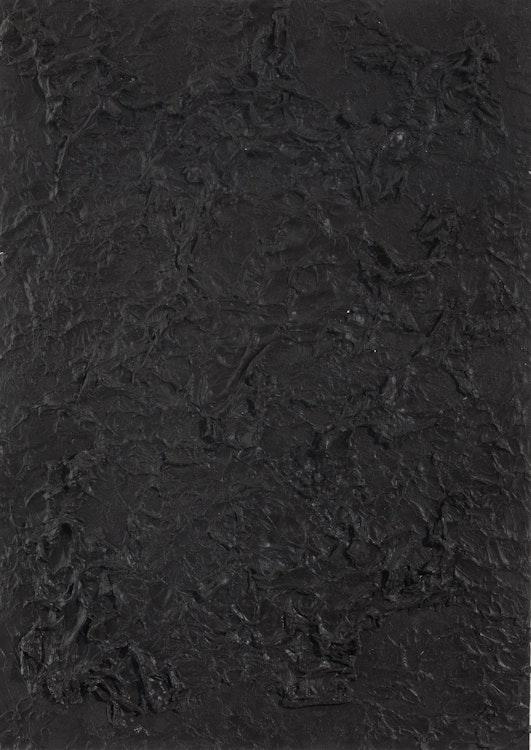Untitled #7, 1981 by Ronald Albert Martin

Ron Martin
Untitled #7, 1981
acrylic on paper
signed, titled and dated "May 6, 7, 1981" in the lower margin; titled and dated "May 6, 7, 1981" to two gallery labels on the reverse
27 x 17 in ( 68.6 x 43.2 cm ) ( subject )
Auction Estimate: $12,000.00 - $15,000.00
Price Realized $10,200.00
Sale date: May 28th 2025
Carmen Lamanna Gallery, Toronto
Private Collection, Ontario
Michael Gibson Gallery, London, Ontario
Private Collection
Ron Martin, 'A Justification for Abstraction 1988', in "Ron Martin: 1971-1981", Toronto, 1989, page 106
Walter Klepac, "Ron Martin, To Foil Oils Phase III and IV", Toronto, 1999, unpaginated
Martin emphasized the importance of the viewer’s intellectual engagement with his work, writing: “When I was installing the scraped-off black paintings in a 1981 show at the AGO, they looked like empty-blank surfaces with nothing on them. It took an act of the will, through an intense process of observation, to redeem their familiarity. And it was not until this had happened that I realized that the making of these paintings has been reduced absolutely to a physical process that was, in turn, the container for psychic projection, ‘pure’ and ‘simple’. By pure, I mean the idea and by simple, I mean the symbol. Idea and symbol go hand and hand. You cannot have one without the other.”
Share this item with your friends
Ronald Albert Martin
(1943)
Ron Martin, painter (b at London, Ont 28 April 1943). Ron Martin studied at H.B. Beal Secondary School in London, Ont, began working in a studio shared with Murrary FAVRO in 1964, and had his first solo exhibition in Jack Pollock's gallery in Toronto in 1965. Martin admired Jackson Pollock, Milton Resnick and other Abstract Expressionists, and his interest quickly turned to abstraction.
Martin has consistently worked in series, such as the monochromatic "Bright Red Paintings" of 1972 and the subsequent "Black Paintings," with which he was engaged from 1974 to 1981. In these series he employed a wide range of techniques: pouring, brushing, scraping, and using his bare hands, and consistently worked on the floor or other flat surfaces. The monochromatic paintings began as vigorously gestural works and then evolved into thin surfaces, from which much of the paint had been scraped away, and ultimately to highly textured accumulations of dense, encrusted acrylic. The "Black Paintings" represented Canada (along with Henry Saxe's sculptures) at the Venice Biennale in 1978.
Throughout his career, Martin has rigorously moved on from each series to other quite different ones. The "Black Paintings" were followed by much sparer grid works, the "Geometric Paintings" (1981-85), and then by the more painterly "Black, White and Grey Paintings." In the 1990s he created a number of series based on a configuration of circles, using oil paint squeezed directly from the tube.
Martin often set arbitrary constraints on his process, eg, limiting a painting to one gallon of paint, two gallons or twenty gallons. Or he might set a time limit to the production of each work. These procedures suggest an affinity with conceptual art, but Martin also views them, and other aspects of his artmaking, as in keeping with Leonardo's advice to the artist to "look at certain walls stained with damp or at stones of uneven colour" so that "the spirit [will be] quickened to new inventions." Martin therefore places Leonardo in a line of thought leading to the psychoanalytic theories of Sigmund Freud and Carl Jung, and on the basis of their work he takes it for granted that "the creative process is an unconscious" one that functions best when the artist is focused on the sheer materiality of painting.
In 2012 Ron Martin was awarded a Governor General's Award for Visual and Media Arts.

